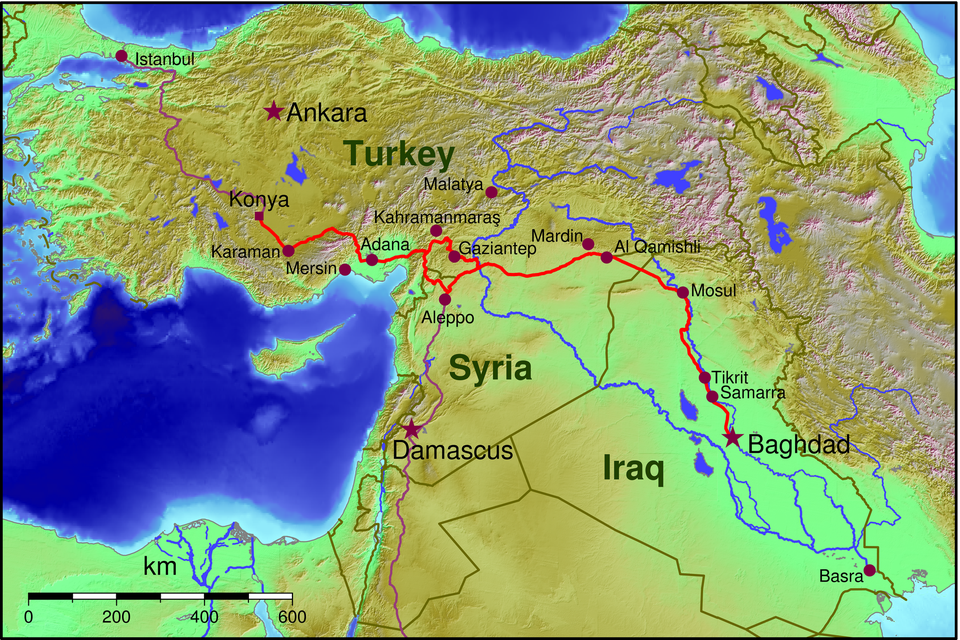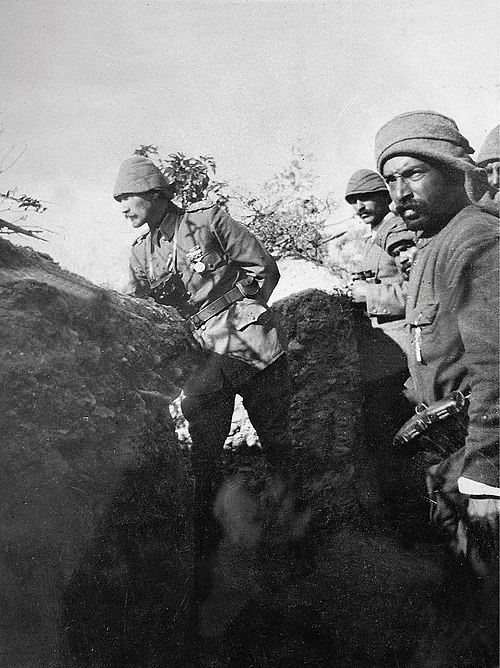IB Syllabus focus:
'Investigate the reasons for the Ottoman Empire’s entry into World War I, the impact of the war, and the subsequent rise of Atatürk, leading to the collapse of the empire.'
The Ottoman Empire's entry into World War I was a pivotal event that had profound repercussions on its territorial integrity, society, and the political landscape, eventually leading to the empire's collapse and the establishment of modern Turkey under Mustafa Kemal Ataturk.
Reasons for Ottoman Entry
Strategic Imperatives
The Ottoman Empire, strategically cornered and diplomatically isolated, saw an alliance with Germany as a necessary move to counterbalance Russian ambitions, particularly in the straits of the Dardanelles and Bosporus, which were of critical importance for Russian naval access from the Black Sea to the Mediterranean.
Economic Motivations
Economically beleaguered, the Ottoman state was heavily indebted to European powers. German financial and industrial support, particularly for key infrastructure projects like the Berlin-Baghdad Railway, promised a much-needed economic boost.

Map showing the projected and completed sections of the Berlin–Baghdad (Baghdad) Railway linking Anatolia to Mesopotamia, a centerpiece of German–Ottoman economic cooperation before and during the war. The route highlights why control of Anatolia and Mesopotamia had strategic and economic significance. Source
Political Calculations
Internally, the Young Turks, a reformist and nationalist faction who had gained substantial influence, believed that the empire's alignment with the Central Powers could restore its dwindling prestige and territorial sovereignty.
The Great War and Its Toll on the Empire
Military Campaigns
Ottoman forces were engaged in numerous fronts, the most notable being the Gallipoli Campaign, the Caucasus Campaign against Russia, and the Sinai and Palestine Campaign against the British Empire.
Human and Economic Costs
The war exacerbated economic conditions, leading to famine, epidemics, and population displacement. Conscription and loss of manpower also took a dire toll on agricultural production and industry.
Minority Relations
The empire’s wartime policies towards its Armenian population led to systematic massacres and forced deportations, which have been recognized by many countries and historians as genocide. This tragedy remains a deeply contentious and painful chapter in Turkish-Armenian relations.
The Emergence of Mustafa Kemal Ataturk
Hero of Gallipoli
Mustafa Kemal's reputation as a military leader was cemented at Gallipoli, where his leadership was pivotal in thwarting the Allied invasion. His status as a war hero provided a platform for his later political ascendancy.

Mustafa Kemal (later Atatürk) observing the battlefield from Turkish trenches during the Gallipoli campaign, June 1915. The image underscores his frontline leadership that made his reputation and laid the groundwork for his later political role. Source
Vision for a New Turkey
After the war, Kemal opposed the partitioning plans of the victorious Allies and the perceived complacency of the Ottoman Sultan. He envisioned a secular, nationalist republic in the Anatolian heartland of the Ottoman Empire.
Mobilisation of the National Movement
Mustafa Kemal convened the Sivas Congress and later the Ankara-based Grand National Assembly, rallying Turkish nationalists to resist foreign occupation and the dismantling of the empire.
The Disintegration of the Ottoman Empire
Armistice and Occupation
The Armistice of Mudros in 1918 paved the way for the occupation of key Ottoman cities by the Allies, including Constantinople (Istanbul) and Izmir (Smyrna), leading to national humiliation and sparking resistance.
The Treaty of Sevres
The Treaty of Sevres, perceived as a death sentence for Turkish sovereignty, proposed the carving up of Ottoman lands among the Allies and the creation of an independent Armenian state and a Kurdish entity.
Nationalist Victory and the Sultanate's End
Kemal's forces successfully repelled Greek advances in Western Anatolia and reclaimed Istanbul. In the aftermath, the Sultanate was abolished in 1922, clearing the path for a republican form of government.
Mustafa Kemal Ataturk's Foundational Reforms
Secular and Legal Reorganisation
The abolition of the Caliphate in 1924 and the adoption of a secular civil code were monumental shifts that dismantled the Islamic theocratic elements of the Ottoman state.
Cultural and Educational Overhaul
Ataturk's cultural reforms included the adoption of the Latin alphabet, the encouragement of western fashion, and the establishment of a public education system free from religious dogma.
Economic Restructuring
Ataturk's economic policies aimed to break from the agrarian past by incentivizing industrial development and establishing state-run enterprises to lessen foreign dependence.
Diplomatic Realignment
The Lausanne Treaty of 1923 marked international recognition of the Republic of Turkey's sovereignty, leading Ataturk to pursue a foreign policy premised on 'peace at home, peace in the world.'
Conclusion
The saga of the Ottoman Empire during World War I and the subsequent rise of Ataturk as a reformist leader embodies a dramatic transition from a centuries-old empire to a modern nation-state. These transformative years are a testament to the enduring impact of leadership and vision in shaping national destiny.
FAQ
The Balfour Declaration, issued by the British government in 1917, stated Britain's support for the establishment of a "national home for the Jewish people" in Palestine, which was then part of the Ottoman Empire. This declaration was significant as it signalled an eventual end to Ottoman rule in Palestine by implying a commitment to Jewish statehood in a territory that was predominantly Arab. This policy was at odds with the McMahon-Hussein Correspondence, which had promised the Arabs independence, including in Palestine, for their support against the Ottomans during the war. Consequently, it also laid the groundwork for future conflict in the region.
The Armistice of Mudros, signed on 30 October 1918, marked the end of hostilities between the Ottoman Empire and the Allies. The terms of the armistice entailed far-reaching military concessions, including the allowance of Allied occupation of forts and territories, notably the strategic Dardanelles and Bosphorus straits. This agreement effectively opened the door for Allied forces to occupy key regions of the Ottoman Empire and ultimately led to the partitioning of its lands. It signalled the end of Ottoman sovereignty and was the prelude to the harsher Treaty of Sevres, which aimed to dismantle the Ottoman Empire completely.
The Battle of Sakarya, fought from 23 August to 13 September 1921, was a turning point in the Turkish War of Independence. Regarded as one of Mustafa Kemal Ataturk's greatest military successes, this battle marked the halt of Greek advance into Anatolia. A victory at Sakarya affirmed the resolve and capability of the Turkish Nationalist forces under Ataturk's command. It also galvanized international support for the Turkish cause and diminished the credibility of the Greek position in Asia Minor. The battle's outcome laid the foundation for the eventual Turkish victory in the Greco-Turkish War, pivotal in the establishment of the Republic of Turkey.
The abolition of the Caliphate by the newly established Turkish Republic in 1924 had significant repercussions across the Islamic world. The Caliphate, which had been held by the Ottoman sultans, was a symbol of Islamic unity and the political-religious leadership of Muslims. Its dissolution ended any vestiges of Ottoman influence over Muslim nations and ushered in a new era of nation-states in the Middle East. It was met with dismay by many Muslims outside Turkey, leading to the rise of movements that aimed to either restore the Caliphate or find new forms of political representation for Muslims. This event had profound ideological and geopolitical ramifications that resonated throughout the 20th century and into the 21st.
The Sykes-Picot Agreement, secretly signed in 1916, had dire implications for the Ottoman Empire, as it signified a clandestine arrangement between France and Britain to divide Ottoman territories in the Middle East between them following the war. This agreement undermined the sovereignty of the Ottoman Empire and contradicted promises made to Arab leaders regarding their independence. For the empire, which was already crumbling under the pressures of war, Sykes-Picot was a stark betrayal by the Allies and fuelled the sense of distrust among its Arab subjects. It was a catalyst for Arab nationalism and sowed the seeds for future conflicts in the region.
Practice Questions
Ataturk played a decisive role in the transition from the Ottoman Empire to the Turkish Republic. His leadership during the Gallipoli Campaign established his military credentials, enabling him to later galvanize nationalist sentiment against Allied occupation and the Sultanate's decisions. Following World War I, he masterminded the Turkish War of Independence, which thwarted Greek advances and precipitated the abolition of the Sultanate. Ataturk's subsequent reforms were radical; he replaced Islamic institutions with secular, western-oriented systems, reformed education, and introduced new legal codes, thereby laying the foundation for the modern Turkish state.
World War I was catastrophic for the Ottoman Empire, exacerbating internal weaknesses and intensifying external pressures. Internally, the war precipitated economic collapse, famine, and a devastating toll on human life, which further undermined the legitimacy of the ruling elite. The empire's engagement on multiple fronts, including the Gallipoli Campaign and conflicts with British forces, stretched its military capabilities. Externally, defeat led to the imposition of the Treaty of Sevres, which sought to dismember Ottoman territories. The ensuing nationalist backlash, spearheaded by Mustafa Kemal Ataturk, directly contested the empire’s survival, resulting in the establishment of the Republic of Turkey and the end of the Ottoman dynasty.

